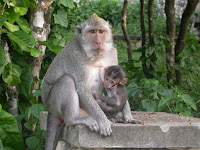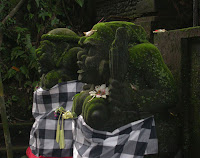Photo Slide Show
 We left Benoa and headed back across to Lembongan Island. This seemed a good idea to stage us for the overnight trip to Kangean Island. WRONG. A big brain dead on this one! We fought up to five knots of current and spent all afternoon going twelve miles. Then a shocking night rolling round on a mooring. Then we set out in the morning and found we were going nowhere. Motoring forward at six knots against six knots of current adds up to nothing!
We left Benoa and headed back across to Lembongan Island. This seemed a good idea to stage us for the overnight trip to Kangean Island. WRONG. A big brain dead on this one! We fought up to five knots of current and spent all afternoon going twelve miles. Then a shocking night rolling round on a mooring. Then we set out in the morning and found we were going nowhere. Motoring forward at six knots against six knots of current adds up to nothing!
So we slewed across to the Bali mainland, and did what all fair minded sailors do, hug the shore and hope you miss the main current flow. We steadily went forward at a more respectable pace of 3-4 knots. An nice surprise was we caught a mackerel and enjoyed sashimi in the evening. The mountains of Bali really looked spectacular as we rounded the northeast cape. The local fishing fleets were heading out as we cleared the mainland so it was a constant job of ducking and weaving between the boats as we crossed paths. As the sun set, lots of Risso's dolphins put on a display
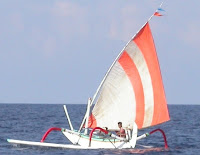
An interesting thing happened when we cut our motor to try to sail (to no avail). As we slowed and changed course, the fishing boats near us changed course and followed us and then approached quite closely. Curiosity I think. We just waved and resumed our original motoring course. They continued to follow us for quite a while before going back on their own courses.
The tension about sailing in these waters is high for cruising yachts. The talk of pirates and aggressive boats is in every magazine article and it is easy to construe every incident like we had as a 'close call'. I think the reality is they are just curious and mean no harm.
So motor on we went, glassy conditions, and a constant stream of shipping to watch out for made the night pass. We arrived at Kangean Island in the morning and we anchored in the wide open bay. Not a lot to say about this place as we just had a night's rest and moved on. The village in the distance looked idyllic on the little island at the head of the bay but we never ventured ashore. A few boats out fishing called past and asked the usual questions. The next day we were determined to sail so we got the spinnaker out and set it up ready to catch any hint of a breeze. After four or five hours we found we'd gone sideways a mile but not an inch forward. We even went for a swim which was a first for us as we'd never gone swimming in the open sea before. A weird feeling but refreshing nonetheless.
We now had almost three days of almost continual motoring with one morning giving us a break. This is not the season to sail. Anyway, better no wind than too much. We saw a constant amount of shipping, so the watches needed to be alert. One thing was many of these boats were quite large but being wooden didn't always show up on radar but they were lit well. We approached the coast of Kalimantan around midnight on April 12 and made a cautious approach and anchored for the night in Kumai Bay before heading up into the river the next day, on a rising tide.
 After pancakes for breakfast we up-anchored and headed up the river. It was a bit complicated coming in, but good information on what to expect made it OK, but still pretty stressful moving about in the shallow water of five odd metres. We travelled a few miles up the river to find the town and anchored opposite the town. Immediately a few boats came out to 'tout' their services to take us to see the orangutans. We had already decided that we'd go with Harry as virtually all the boats we knew had gone with him and were very happy.
After pancakes for breakfast we up-anchored and headed up the river. It was a bit complicated coming in, but good information on what to expect made it OK, but still pretty stressful moving about in the shallow water of five odd metres. We travelled a few miles up the river to find the town and anchored opposite the town. Immediately a few boats came out to 'tout' their services to take us to see the orangutans. We had already decided that we'd go with Harry as virtually all the boats we knew had gone with him and were very happy.Harry came aboard and gave us the run down on the tour options. At first we had planned to do a two-day trip like most of the yachts before us but ended up going for the three-day trip. We found out from Harry we could clear out of Indonesia here and with ten days left on our visa it would mean we could have a more leisurely stay in Kumai and take our time sailing to Singapore.
The rest of this page is a copy of content I used in making a website for Harry. It may sound very 'glowing' but the trip was as good as it sounds. Truly one of the great things we have experienced.
Harry took away copies of our paperwork and dealt with the various authorities for us.
We needed to get some money so the next day Harry met us ashore and we caught a bemo together into the nearby larger town of Pangkalan Bun, 15 kms away. This town held ATM's and an Internet Cafe. We collected our money and then went for a fascinating walk down by the river front where a complete village exists on piles out over the river. It was great and worth the trip into Pangkalan Bun just to see this.
 After a nice lunch in a warung (small basic restaurant) and during lunch Harry showed how warm he was towards Anna. They played chinese checkers and UNO and the rest of the people in the warung looked on. An urgent trip to the toilet caused us to call in at the local fire station. So here is a picture for my mate Kim!
After a nice lunch in a warung (small basic restaurant) and during lunch Harry showed how warm he was towards Anna. They played chinese checkers and UNO and the rest of the people in the warung looked on. An urgent trip to the toilet caused us to call in at the local fire station. So here is a picture for my mate Kim!Next day was the start of the trip. We were packed as per Harry's list and a few extra treats. (Sweets for the kids, wine for the adults). The traditional river boat , Britannia, skippered by Jien and crewed by Jenne (both brothers of Harry) came alongside at 8:30am as arranged and the boat minder moved aboard Reflections IV.
We headed downstream and after a kilometre turned up into the Sekonyer river. The river was lined with huge clumps of nipa palms, and after a while they reduced and were replaced by pandanus. Harry pointed out that this was a sign the river was now predominately fresh water. Elizabeth called out 'Hornbill!' and immediately Jien stopped the boat and we all looked up to see a pair of hornbills flying off. This heightened everyone's attention and not long after two Rhinoceros Hornbills, perched in a tree, were observed by all of us before they flew off.
Maybe it was because we had three days to cover what most did in two days, but whenever something was spotted Jien would stop the boat, back up if necessary and waited til we were ready to move on. Slowly the river narrowed and we found we could lay down on the mattresses and pillows and look out and up into the forest canopy while relaxing in the shade. The only way to travel!
It was Elizabeth's birthday and we had bought a small cake in town the day before. When coffee and tea was served the cake was produced only to be outdone by a much larger one made by Harry's sister, Arlie, complete with Happy Birthday Elizabet written in icing. When questioned on how he knew Harry replied - why your passport copies of course!
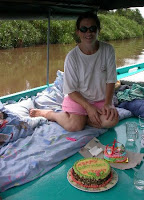 The Sekonyer river forms the western border of the national park and is the only transport route for the village communities along it. The loud motors of the open motorised canoes would be heard way in advance of the approaching canoe.
The Sekonyer river forms the western border of the national park and is the only transport route for the village communities along it. The loud motors of the open motorised canoes would be heard way in advance of the approaching canoe.As we traveled further along the river we spotted many different birds including two types of hornbills, beautifully coloured kingfishers and eagles flying high above. Often Harry would say "listen" and we'd pick up a bird calling. He amazed us how he would then quote the local, English and often the Latin name of the bird. He seemed to be able to do this for every animal we came across.
Our first stop was out Tanjung Harapan, an orangutan sanctuary where three orangutans were in the process of rehabilitation. This involves their slow adjustment from their previous life with humans (as pets or rescued from logged areas) to life back in the wild. The process is to provide shelter in the form of a night/socialisation cage and food in morning and evenings. Then as the orangutans are felt to be ready, they are encouraged make nests in the trees and supplemental feeding is given at feeding platforms out in the forest. Orangutans that have been there longer take on surrogate mother roles to the newcomers and, although this is not natural habit in the wild, it seems to work.
Harry remarked that 200 orangutans had been reintroduced into the forest through the three sanctuaries in the park. With an estimated population of around 800 orangutans in the entire park this is a real success story.
We spoke to people at the sanctuary and they said they were sorry but the three orangutans were out in the forest and would not return until the late afternoon. This was a good sign from a rehabilitation point of view but obviously we were disappointed and we all started to wonder whether we would see many during the trip. We returned to the boat to find lunch prepared for us. This was a feature of how well organised Harry and his brothers were, as we often found a meal or a snack prepared for us after an activity.
 Traveling on a yacht keeps you in control of many decisions, especially what you eat. So when lunch was served we were relieved when we saw what was to be provided. Clean, fresh and tasty Indonesian fare was the manner of the meals. A plate of potato chips and fried bananas were nice treats with many of the meals. There was always plenty of food.
Traveling on a yacht keeps you in control of many decisions, especially what you eat. So when lunch was served we were relieved when we saw what was to be provided. Clean, fresh and tasty Indonesian fare was the manner of the meals. A plate of potato chips and fried bananas were nice treats with many of the meals. There was always plenty of food.We set off again heading towards Pondok Tanggui, the second sanctuary which was about an hour away. Well this took a lot more than an hour, as we constantly stopped to watch Proboscis monkeys, Long-tailed Macaque, more birds and best of all we saw several orangutans in the wild.
We always expected to see orangutans at the sanctuaries, but to see truly wild orangutans in their natural habitat was such a thrill. Our timing (late April) meant that fruit was ripening on trees bordering the river and they were making themselves very visible as they fed near the river. Over the three days, from the river, we spotted 15 orangutans in the wild.
Courtney (11) and Anna (8) summed it up: "This is so cool!".
The boat came alongside the jetty at Pondok Tanggui and as we started to walk down the boardwalk to the buildings we started to see orangutans here, there and literally everywhere. This was great!
We made our way down to the feeding platform and saw that many of the orangutans behaved just like they were the children of the workers. We started to realise the challenges faced by the orangutans and the people working with them. It must be so hard to be detached and not to encourage contact as the orangutans always seemed to be after a hand to hold. A legacy of their previous experiences we suppose.
We sat at the feeding platform and watched the orangutans,as well as those that had walked with us, also those that had come down from the trees. We could see the pecking order with the large male having the upper hand and the other ones tentatively made their way forward as the large male moved off. This male was not a rehabilitated orangutan but had just decided to stake this territory out - maybe the free food was a deciding factor.
The CD version has a movie of the orangutans at Tondok Panggui, Agile gibbons and a large male orangutan at Camp Leakey, a wild orangutan seen from the river and orangutans at the feeding platform at Camp Leakey
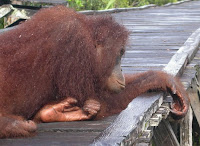 We returned to boat and enjoyed a snack with tea & coffee and made our way a short way up the river and then turned up a tributary which would lead us to Camp Leakey. The water here was a deep black and dark and only just wide enough for the boat to make its way. In the evening light it was a beautiful sight. Harry explained how the Sekonyer river should be the same colour but it was polluted from upriver mining and palm-oil operations. This and many issues were explained to us as we went along. Harry talked and asked for our comments on methods to improve the life of the nearby communities and seemed genuine in his efforts to have sustainable development that produced improvements for the people through conserving the natural surroundings.
We returned to boat and enjoyed a snack with tea & coffee and made our way a short way up the river and then turned up a tributary which would lead us to Camp Leakey. The water here was a deep black and dark and only just wide enough for the boat to make its way. In the evening light it was a beautiful sight. Harry explained how the Sekonyer river should be the same colour but it was polluted from upriver mining and palm-oil operations. This and many issues were explained to us as we went along. Harry talked and asked for our comments on methods to improve the life of the nearby communities and seemed genuine in his efforts to have sustainable development that produced improvements for the people through conserving the natural surroundings.We stopped for the night at a unused Proboscis Monkey research station. We had a near full moon and the forest canopy looked great under the moonlit sky. We woke in the morning with heavy rain and wondered if it would let up. Luck was with us and we were soon back to sunny skies.
We steadily made our way along towards Camp Leakey.
 Camp Leakey is the best know of the sanctuaries and was founded and still run by Prof Birute Galdikas, a Canadian scientist who has run an ongoing study of orangutans here for twenty years. Leakey is named after Dr Louis Leakey the anthropologist who encouraged Prof Galdikas to come to study the unique Asian great ape, the orangutan which means 'person of the forest'. She was among three Dr Leakey sponsored. The other two were Jane Goodall, who studied chimpanzees for 30 years and Dian Fossey, of Gorillas in the Mist fame, who studied mountain gorillas.
Camp Leakey is the best know of the sanctuaries and was founded and still run by Prof Birute Galdikas, a Canadian scientist who has run an ongoing study of orangutans here for twenty years. Leakey is named after Dr Louis Leakey the anthropologist who encouraged Prof Galdikas to come to study the unique Asian great ape, the orangutan which means 'person of the forest'. She was among three Dr Leakey sponsored. The other two were Jane Goodall, who studied chimpanzees for 30 years and Dian Fossey, of Gorillas in the Mist fame, who studied mountain gorillas.We walked into the camp and saw many orangutans around us. We came to the office to sign the visitors book first, and noticed a huge male orangutan lounging on a seat and behind several agile gibbons zooming round. Agile is the perfect name for them and we watched for ages as they swung backward and forwards. They were also in the process of being rehabilitated back to the wild.
We went for a lovely cool walk in the rainforest to get to the feeding platform and saw the 'usual' beautiful array of trees, vines mosses and fungi. When we arrived at the platform a large male was feeding and the others were standing back. Once again showing the dominating role the large males play. Orangutans are normally solitary and the males hold a territory and then meet females as they pass through. The young stay with their mothers for up to eight years.
Back at the boat we had lunch and a wash. There is a shower on the back of the boat but it was more fun to get buckets of water and pour them over you to keep the heat at bay. Several of the orangutans came down to the boat to investigate us and even after seeing so many it was fascinating watching them.
After a longer walk around the forest to get some needed exercise, we headed downstream and anchored amongst the panadus off the main tributary. Once again a glorious evening under a full moon. After a breakfast of banana pancakes we made our way back down the tributary and saw so many monkeys we lost count. One group of proboscis monkeys leaped across the water from one side to the other only a few metres in front of us!
 Our last day was spent visiting the two sanctuaries on the Sekonyer again, taking a long walk (in the rain!) at Pondok Tanggui, and stopping all the time to see more wild orangutans, monkeys and birds. We came to the bottom reaches of the Sekonyer just after dark and started to see fireflies in the trees. Harry was dissapointed for us as the full moon and rain had reduced their numbers. "Normally they are like christmas trees" he assured us. We didn't care. It had been a perfect enough trip for us.
Our last day was spent visiting the two sanctuaries on the Sekonyer again, taking a long walk (in the rain!) at Pondok Tanggui, and stopping all the time to see more wild orangutans, monkeys and birds. We came to the bottom reaches of the Sekonyer just after dark and started to see fireflies in the trees. Harry was dissapointed for us as the full moon and rain had reduced their numbers. "Normally they are like christmas trees" he assured us. We didn't care. It had been a perfect enough trip for us.We turned back into the Kumai River and in the distance the masthead light of Reflections IV could be seen. Our home had been looked after well, Ketut, our bird was still singing and we climbed into our bunks well satisfied with our adventure.
A final note on how happy we were with the trip. Harry, Jien and Jenne made our children, Courtney and Anna, so welcome. They played games with them, sang songs, making our holiday all the more relaxing.
The next few days we relaxed and thought about getting moving again. Easter and that bunny came, and being on holidays we had a relaxed time. One night Liz woke thinking there was someone on deck. Looking at she heard scratching and rustling and soon realised a huge clump of nipa palms had floated past and rubbed against the boat. We saw a few more go past in the daylight, then this monster hit us and bumped down the side. The hazards of the rivers of Borneo!
From here we sail to Malaysia. First stop will be Johor Bahru just across from Singapore. We hope for wind (as usual) and plan to take our time stopping at a few small islands on the way. Read Where are they now? to see how it's going.
Photo Slide Show

















